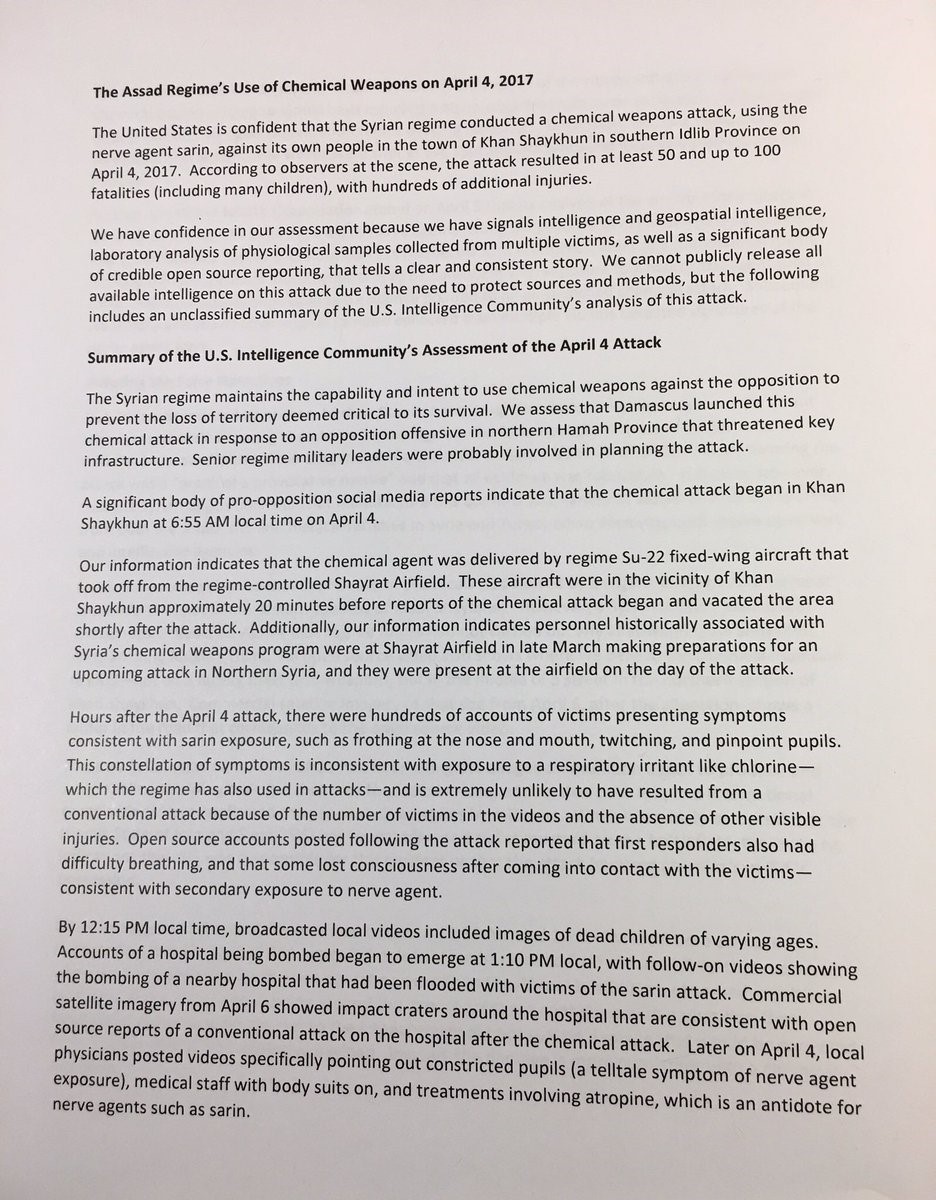
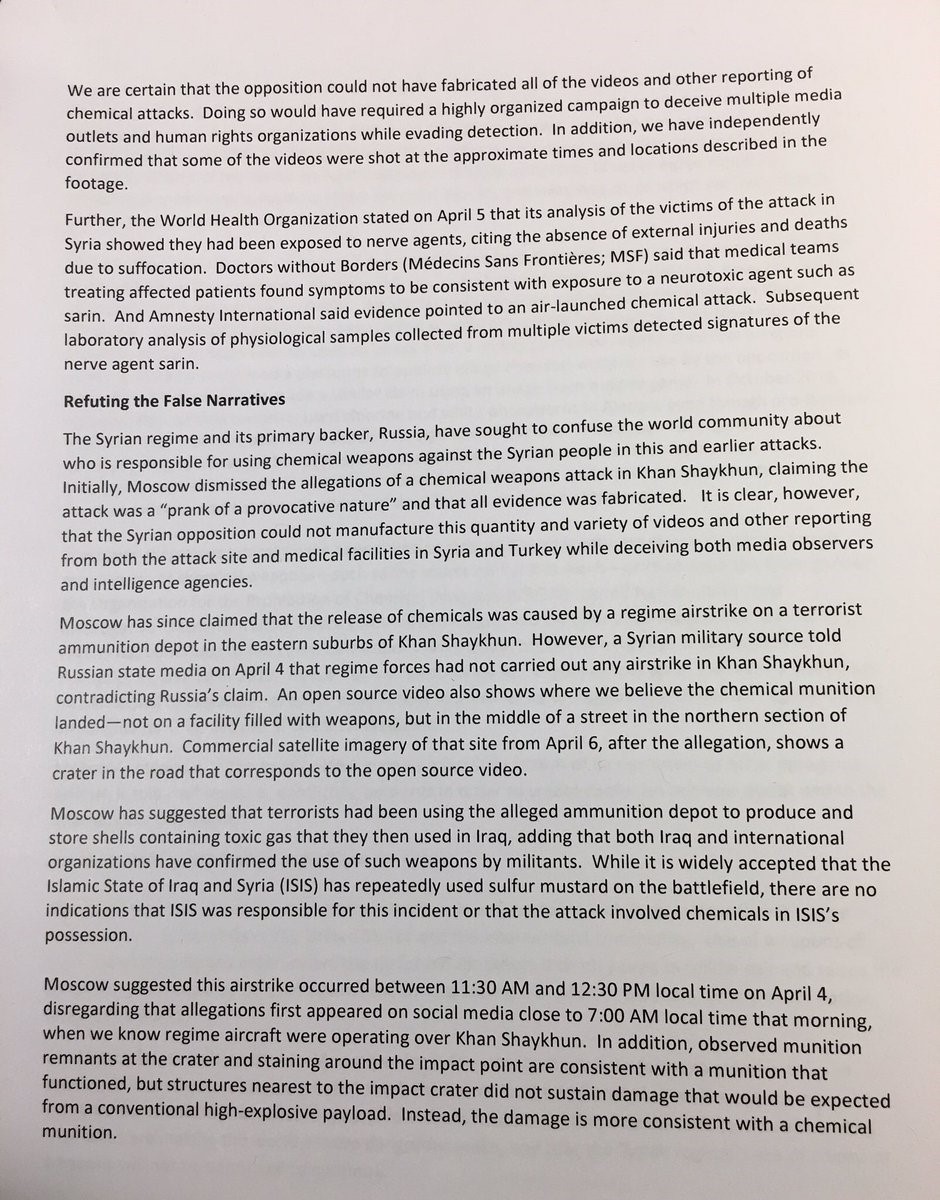
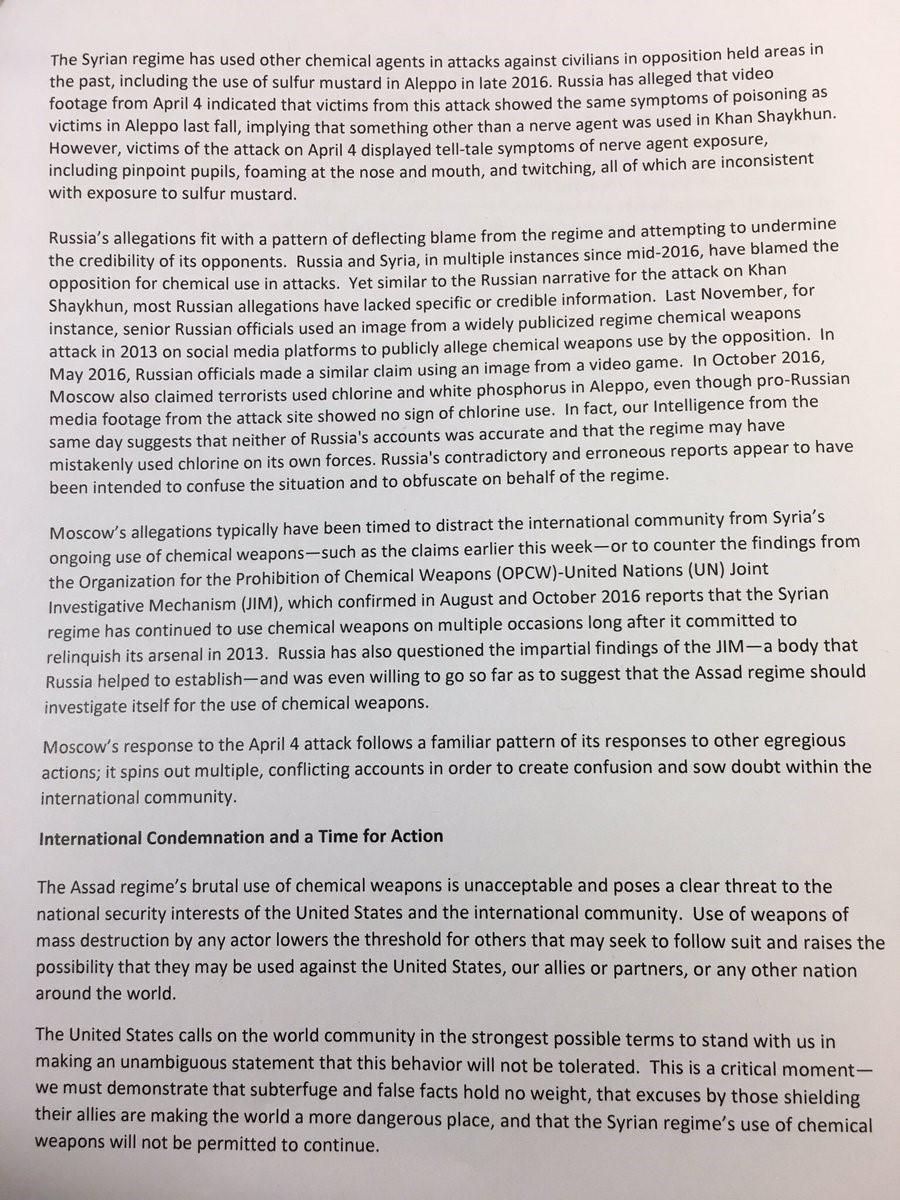
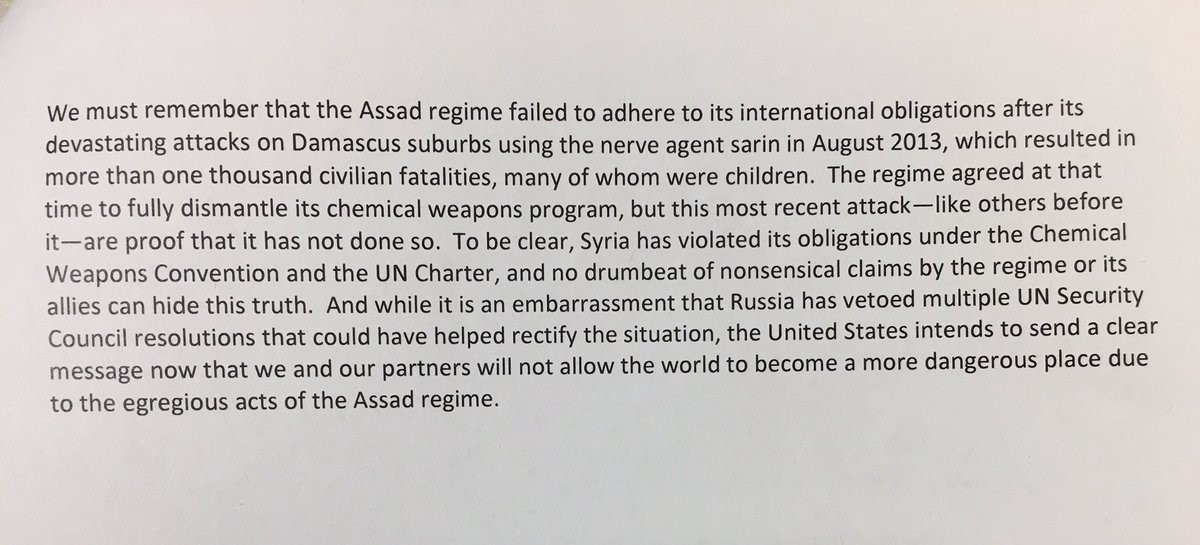

Update:
According to that CW disarmament specialist, ОБАС-250-235П is one and only Sov/Rus aviation bomb to spread Sarin. That looks like filler cappic.twitter.com/1sSpNdHt0m and Associated Press is reporting:
Senior U.S. official says U.S. has concluded that Russia knew in advance of Syria’s chemical weapons attack last week – AP

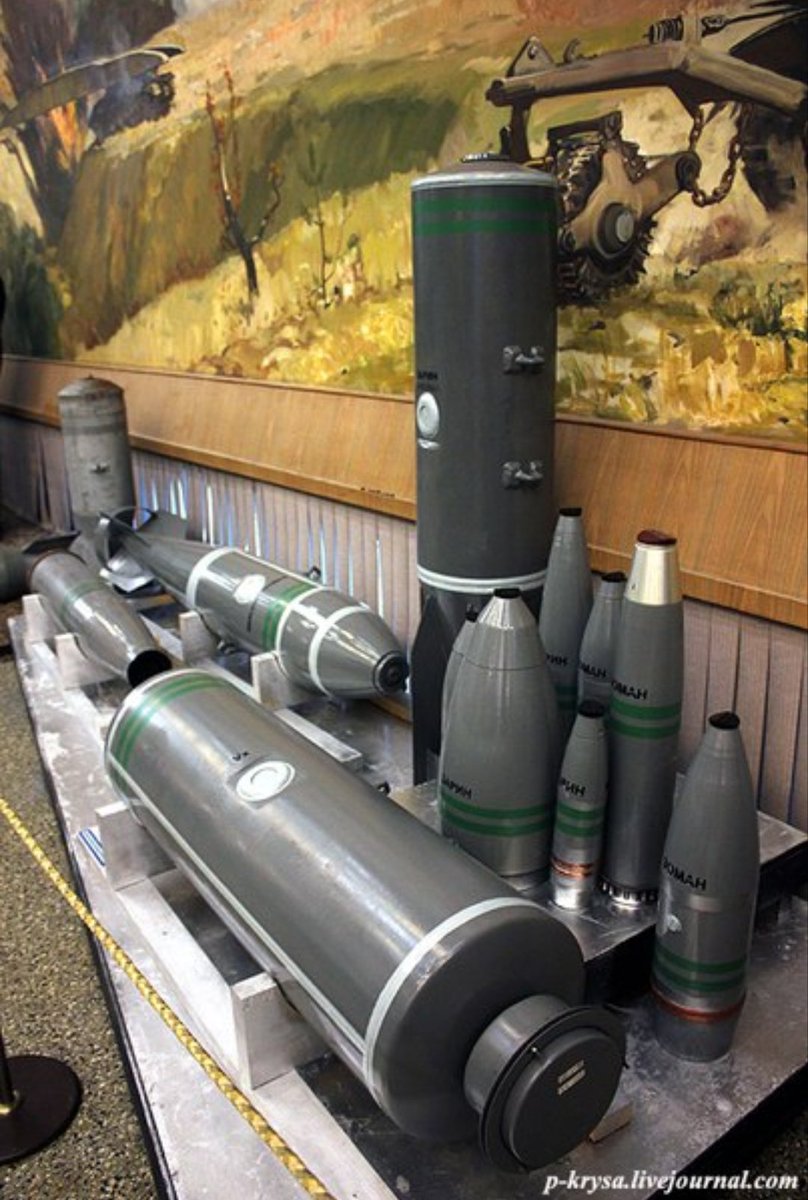

So….
Who lied? Susan Rice? Yes, John Kerry? Yes, Barack Obama….especially yes. While John Kerry worked with Russia to eliminate the ‘declared’ chemical weapons in Syria…note below it refers to mustard gas. When Russia presented the document to the Obama administration, we signed it as well. So, the Assad regime, Putin, Iran and the Obama White House all have their feet in this swamp. Got that?
Also note the percentage of the CW inventory destroyed…hummm right?
Release No: NR-052-14
January 27, 2014M/V Cape Ray Deployment
Today the Department of Defense announced the deployment of M/V Cape Ray from Portsmouth, Va. M/V Cape Ray is the primary contribution of the Department of Defense toward international efforts to eliminate Syria’s chemical weapons material program. Over the last several months, hundreds of government and contract personnel have worked tirelessly to prepare the vessel to neutralize Syrian chemical materials and precursors using proven hydrolysis technology. This achievement could not have been possible without these remarkable contributions.
The United States remains committed to ensuring its neutralization of Syria’s chemical materials prioritizes the safety of people, protects the environment, follows verification procedures of the Organization for the Prohibition of Chemical Weapons (OPCW), and with applicable standards. All waste from the hydrolysis process on M/V Cape Ray will be safely and properly disposed of at commercial facilities to be determined by the OPCW. No hydrolysis byproducts will be released into the sea or air. M/V Cape Ray will comply with all applicable international laws, regulations, and treaties.
It is the responsibility of the Assad regime to transport the chemical materials safely to facilitate their removal for destruction. The international community is poised to meet the milestones set forth by the OPCW, including the June 30 target date for the total destruction of Syria’s chemical weapons materials. The United States joins the OPCW and the United Nations in calling on the Assad regime to intensify its efforts to ensure its international obligations and commitment are met so these materials may be removed from Syria as quickly and safely as possible.
Transfer of Syrian Chemicals to Cape Ray is Complete
A trailer operator for Medcenter Container Terminal transfers a container from the M/V Ark Futura, a Danish cargo ship, along the dock to the loading deck of M/V Cape Ray during operations at the Italian port of Gioia Tauro, July 2, 2014. The Cape Ray is tasked with the neutralization of specific chemical materials from Syria in accordance with the Organization for the Prohibition of Chemical Weapons guidelines while operating in international waters. U.S. Navy photo by Seaman Desmond Parks
WASHINGTON, July 3, 2014 — The transfer of Syrian chemicals from the Danish container ship Ark Futura to the Motor Vessel Cape Ray has been completed, Pentagon Press Secretary Navy Adm. John Kirby said in a statement issued yesterday.
After the transfer was made in the Italian port of Gioia Tauro, Kirby said in the statement, the Cape Ray departed yesterday for international waters in the Mediterranean Sea to emp loy its onboard system to neutralize the chemicals.
Kirby’s statement reads as follows:
The transfer of Syrian chemicals from the Danish container ship Ark Futura to the Motor Vessel Cape Ray is complete. Cape Ray departed the Italian port of Gioia Tauro this afternoon for international waters in the Mediterranean Sea, where neutralization operations will soon begin. The neutralization process should take several weeks to complete.
Secretary Hagel is grateful to Danish and Italian authorities for their support in this process and is enormously proud of everyone who helped make possible this safe and incident-free transfer. He extends a special thanks to the men and women of the Cape Ray, Naval Forces Europe, and U.S. European Command teams for their impeccable planning and execution.
***
WASHINGTON, Feb. 13, 2014 – The container ship M/V Cape Ray has arrived at Rota, Spain, for a port visit while en route to aid in removal of Syrian chemical materials, Pentagon spokesman Army Col. Steve Warren said.
The vessel — part of the Transportation Department Maritime Administration’s Ready Reserve Force program — left Portsmouth, Va., Jan. 27. Hundreds of government and contract personnel worked for several months to prepare the vessel to neutralize Syrian chemical materials and precursors using hydrolysis technology.
“When Syria has completed removal of its chemical materials, MV Cape Ray will depart Rota and proceed to the transloading port in Italy, where she will take the chemicals on board,” Warren said in a statement announcing the vessel’s arrival in Spain. “Our ship is prepared and our crew is trained to safely neutralize Syria’s chemical materials. We stand ready to fulfill our contributions to this international effort; it is time for Syria to live up to their obligations to the international community.”
By offering Rota for a port of call before MV Cape Ray receives a load of chemical materials and embarks on the destruction phase of its mission, Spain is making a contribution to the United Nations-sanctioned multinational effort to rid Syria of its chemical weapons materials, officials at the U.S. Embassy in Madrid said.
The United States plans to neutralize the chemicals at sea in international waters using proven hydrolysis technology, embassy officials added. All waste from the hydrolysis process aboard MV Cape Ray will be safely and properly stored on board until it is disposed of at commercial facilities to be determined by the Organization for the Prohibition of Chemical Weapons, they added, emphasizing that no hydrolysis byproducts will be released into the sea or air.
Defense Secretary Chuck Hagel sent a message to the Cape Ray’s crew, wishing them well as they left Portsmouth.
“As you all know, your task will not be easy,” Hagel wrote. “Your days will be long and rigorous. But your hard work, preparation and dedication will make the difference.
“You are ready,” the secretary continued. “We all have complete confidence in each of you. You represent the best of our nation, not only because of your expertise and commitment, but because of your willingness to serve when called upon. For that, we will always be grateful. We are also grateful to your families for the love and support they have given you. On behalf of our country and the American people, I wish you much success. Take care of yourselves. God bless you all.”
***
WASHINGTON, Aug. 11, 2014 – Specialists on the U.S. container ship M/V Cape Ray continue their work in the Mediterranean Sea, neutralizing chemical materials from Syria and contributing to what the Organisation for the Prohibition of Chemical Weapons, or OPCW, on August 7 confirmed as the destruction of 74.2 percent of Syria’s chemical stockpile.
The Spanish patrol boat Infanta Elena (P-76), left, escorts the container ship MV Cape Ray (T-AKR 9679) through the Strait of Gibraltar en route to the Mediterranean Sea June 26, 2014. U.S. Navy photo by Mass Communication Specialist Seaman Desmond Parks
(Click photo for screen-resolution image);high-resolution image available.U.S. military and civilian specialists aboard the ship began using the field deployable hydrolysis system to neutralize Syrian chemical materials on July 7, Director of Pentagon Press Operations Army Col. Steve Warren told reporters at the time, anticipating that it would take about 60 days to complete the job.
On August 5 at the Aberdeen Proving Ground-Edgewood Team CBRNE capabilities showcase, Adam Baker, a chemical engineer and project manager with the U.S. Army Edgewood Chemical Biological Center, detailed the hard work that went into turning a land-based hydrolysis system into a field-deployable system in just five months.
“We had a gap in capabilities for a system that was transportable, that could be operated out of a remote location and that would [process] bulk liquid agent at high throughputs.”
The system had to be able to be transported to a remote site and set up and be sufficient with a supply of reagents and diesel fuel, Baker explained.
The project was given the go-ahead in February 2013. In November 2013, he said, “That’s when they made the decision to start putting it on the Cape Ray.”
The timeline was short, Baker said, and they couldn’t start from scratch with a new system, so they used a process from the former Aberdeen Chemical Demilitarization Facility, or ABCDF, that had been used a decade ago to neutralize 1,700 tons of mustard – part of the destruction of the United States’ own chemical stockpile.
Baker said the engineers compressed that process into transportable, standardized shipping containers. They had two titanium reactors they could use for the Cape Ray that made it easier for rapid deployment of the two systems that are now on the ship.
One of the Cape Ray’s most critical design factors for the system, Baker said, “was that everything we needed had to go on that ship. Instead of having trucks come in every day and bring the reagent and trucks go out every day with your waste, all of those containers had to go on the ship.”
At least 269 of the standardized shipping containers are on the ship, holding everything the specialists and crew need and everything the hydrolysis process needs and then creates. Nothing is dumped from the ship. More here.
Maybe there is much more to this story than being reported: Kim Jong Un’s half brother killed in Malaysia, sources report but read on.
Exclusive – ‘Dollars and euros’: How a Malaysian firm helped fund North Korea’s leadership
Reuters: Over the past two decades, North Korean-born Han Hun Il, the founding chief executive of a Malaysian conglomerate, funneled money to the leadership in Pyongyang, a North Korean defector, speaking out for the first time, told Reuters.
A sign outside the Malaysia-Korea Partners Holdings headquarters in Kuala Lumpur, Malaysia.(Reuters Photo)
Han’s conglomerate, Malaysia Korea Partners (MKP), worked in partnership with Jang Song Thaek, according to Lee Chol Ho, who worked as a trader for Han for nine years until he defected to Seoul in 2010. Jang, the uncle of North Korea’s ruler Kim Jong Un, was considered one of North Korea’s most powerful men until he was executed for treason in 2013.
Reuters was unable to independently confirm Lee’s account of Han’s relationship with North Korea’s leadership, including his assertion that money was funneled to North Korea’s leadership body, the central committee of the ruling Workers’ Party.
Reuters also couldn’t determine how the central committee, which controls North Korea’s highly sanctioned nuclear and weapons program, used the funds from Han or if the payments are continuing.
The new disclosures come at a time when United Nations sanctions monitors are intensifying scrutiny of both Han and MKP.
A February report by experts monitoring U.N. sanctions on North Korea says MKP’s bank subsidiary in Pyongyang is a particular focus. A 2013 U.N. resolution bars foreign companies or foreign joint ventures with a North Korean company from having a financial subsidiary in North Korea.
The U.N. report says the bank, called International Consortium Bank, was established as a joint venture between MKP and Jang’s Sungri Economic Group. The bank is licensed by North Korea’s central bank and registered with the Pyongyang Municipal People’s Committee, it said.
If the U.N. experts find sanctions have been violated, they could recommend the U.N. Security Council blacklist MKP, its executives or one or more of its subsidiaries, subjecting them to a global travel ban and asset freeze.
STRAINED TIES
Han, also known as Dr. Edward Hahn, hung up the phone and blocked a Reuters reporter on his messaging app when contacted for comment.
MKP did not respond to requests for comment on Lee’s assertions. The company issued a statement dated March 23 saying MKP had “no reason to hide the fact” that Han is North Korean. It denied owning ICB or any other North Korean bank and said nobody from the United Nations has contacted the company.
The U.N. said it does not comment on its ongoing investigations.
Lee’s description of how MKP operated appears to shed fresh light on the close ties between Malaysia and North Korea, which have come under strain following the assassination of Kim Jong Nam, the elder half-brother of North Korea’s ruler, with the highly toxic VX nerve agent in February.
Reuters reported in February that North Korea’s spy agency was running an arms export operation out of Malaysia.
Malaysia’s foreign ministry did not respond to Reuters’ requests for comment.
PYONGYANG BANK
MKP, which Han formed in 1996 with his Malaysian partner, Yong Kok Yeap, operates in 20 countries in Asia, Africa and the Middle East, piling up contracts worth at least $350 million, an MKP corporate video and promotional brochures shows.
Yong declined requests to be interviewed.
MKP’s main business is construction, but it is also involved in a number of other activities, including financial services and coal trading, according to U.N. reports, company sources, registration documents and MKP promotional material.
ICB is among several banks the U.N. is currently investigating for possible breaches of various U.N. Security Council resolutions. These include one from 2013 calling on members states to prohibit financial service companies where there are “reasonable grounds to believe that such financial services could contribute to [North Korea’s] nuclear or ballistic weapons programs.”
In its March 23 statement, MKP said its website had been “hacked” to insert ICB under its list of service companies and place a “doctored photograph” of “MKP personnel”, including Yong, visiting ICB’s office in Pyongyang.
A search of archive.org, a database of old websites, shows ICB has been listed on MKP’s website since 2009, including under its earlier name, Sungri Hi-Fund International Bank. As of April 10, ICB was still listed on the website.
In its February report, the U.N. said it had inquired with Malaysia and MKP about ICB and had “yet to receive a reply.”
‘CONTROL TOWER’
Lee said Han had used MKP as the “control tower” of a vast business empire, making him one of the isolated country’s richest men. He said Han began his career in Africa with North Korea’s Reconnaissance Bureau, its premier spy agency.
“When people from the Central Committee visited Malaysia, they only met with Han,” Lee said. “They didn’t even bother to see the ambassador.”
The Central Committee directs the development and financing of North Korea’s nuclear and missile programs, said Michael Madden, a North Korea expert at Johns Hopkins University’s 38 North website.
Once a year, Lee said, high-ranking Pyongyang officials traveled to Kuala Lumpur to meet Han and instruct him to wire money to North Korea via banks in Malaysia.
“It was all dollars and euros,” said Lee.
Lee said Han was part of Jang’s overseas network of businessmen.
Two current company sources said MKP’s fortunes – with the exception of its African businesses – declined after 2013 and Han became an infrequent visitor to Malaysia. They said they didn’t know whether the downturn was related to Jang’s demise.
The European Commission has launched an “Emergency Trust Fund for stability and addressing root causes of irregular migration and displaced persons in Africa”, made up of €1.8 billion from the EU budget and European Development Fund, combined with contributions from EU Member States and other donors. The Trust Fund will benefit a wide range of countries across Africa that encompass the major African migration routes to Europe. These countries are among the most fragile and those most affected by migration. They will draw the greatest benefit from EU financial assistance. The countries and regions are:
The Sahel region and Lake Chad area: Burkina Faso, Cameroon, Chad, the Gambia, Mali, Mauritania, Niger, Nigeria and Senegal.
The Horn of Africa: Djibouti, Eritrea, Ethiopia, Kenya, Somalia, South Sudan, Sudan, Tanzania and Uganda.
The North of Africa: Morocco, Algeria, Tunisia, Libya and Egypt.
Neighbouring countries of the eligible countries may benefit, on a case by case basis, from Trust Fund projects with a regional dimension in order to address regional migration flo ws and related cross- border challenges. Read the full document here.
EU Economic and Military Investments in Africa Increase
Africa faces a number of security challenges, from terrorist groups such as Boko Haram and al Shabaab, to civil wars and violent conflicts in South Sudan and Libya, to severe droughts causing hunger crises in Somalia and Yemen.
This instability contributes to migration from Africa to Europe. In addition, a demographic boom is taking hold in Africa, stoking concerns about future mass migration. “Today, Africa is twice the population of Europe. In 2050, it will be four times the population of Europe, and it is projected at the end of this century to be 10 times the population of Europe. … There is a sense in many political circles in Europe that what’s happening today is just the beginning of a much bigger movement that could reach Europe tomorrow,” Philippe Fargues, founding Director of the Migration Policy Centre at the European University Institute in Italy, told The Cipher Brief.
The European Union is intervening. On the migration front, the EU is engaged in Partnership Framework Agreements with several African countries to stem the flow of migrants. “This was followed up with the setting up of the EU Emergency Trust Fund for Africa (a €2 billion aid program aimed at securing African countries’ cooperation in tackling irregular migration), leading to the initial signing of bilateral agreements with Niger, Nigeria, Mali, Senegal and Ethiopia” says the Abuja, Nigeria-based Director of the Centre for Democracy and Development, Idayat Hassan.
Niger, for example, is receiving €610 million to keep migrants from reaching Europe, Hassan says, and German Chancellor Angela Merkel has pledged €17 million to Niger to help develop the Agadez region, a major route for West African migrants.
Germany seems to be leading European action in Africa. Last year, German Development Minister Gerd Müller unveiled a “Marshall Plan” for the continent. “Germany and Europe have an interest to save people’s lives, to limit the effects of climate change and avoid ‘climate refugees,’ to prevent mass migration and to help create a future for Africa’s youth,” said Müller.
Asmita Parshotam, a researcher under the Economic Diplomacy Programme at the South African Institute of International Affairs, tells The Cipher Brief that this plan is intended to “cover a broad range of issues such as trade, increased private investment, bottom-up economic development, entrepreneurship, and job creation and employment.”
In addition to Germany’s unilateral aid to Africa, the EU recently announced its EU External Investment Plan that will help expand Africa’s private sector, with €3.35 billion in funding until 2020 and €88 billion if EU member states fully match that contribution.
The European Development Fund and African Investment Facility also provide economic development assistance from the EU to Africa.
In the development-security aid realm lies the EU Sahel Strategy, launched in April 2015. “The enhancement of security in the region through the fight against terrorism, illicit trafficking, radicalisation and violent extremism, remains the key objective of the EU,” according to a memo on the EU Sahel Strategy from the Council of the European Union.
EU member states also host a number of military bases in Africa. France, Germany, Italy, and Spain all have boots on the ground in Djibouti. France’s presence there is now around 1,700 personnel.
About 3,500 French troops operate in Burkina Faso, Chad, Mali, Mauritania, and Niger, and Gabon is a key base that France has used to send troops to interventions in the Central African Republic. France last year boosted its military presence in Cote d’Ivoire to about 900 men to serve as a forward operating base for West Africa.
The French, along with the Germans, are also in Niger. Germany has an air transport base at the Niamey international airport that supports its increasing troop contribution to the UN’s peacekeeping mission in Mali, a country that underwent a rebellion and coup in 2012 and a serious deterioration in the security environment in January 2013 when terrorist groups – Ansar Dine and the Movement for Unity and Jihad in West Africa, in addition to al Qaeda in the Islamic Maghreb – advanced south.
A majority of UN peacekeeping missions, in which many Europeans are involved, are in Africa.
The question remains, will the EU’s economic and military investment in Africa work in stabilizing a continent plagued by terror, war, drought and famine, extreme poverty, and inadequate governance?
Müller’s “Marshall Plan” acknowledges that African governments must take responsibility for fighting corruption, ensuring good governance, and improving opportunities for women.
The EU has made much of its development aid contingent on African governments’ cooperation in addressing the EU’s security concerns. For example, on migration, Parshotam notes that an EU-Mali deal will give Mali aid in exchange for Mali taking back all citizens whose asylum claims were rejected.
But with African countries that have no stable government to work with, it becomes harder for the EU to invest in and create stability. “Libya is a failing state – there’s no central authority,” Leonard Doyle, Spokesperson of the Director General at the International Organization for Migration, told The Cipher Brief. “So the Europeans have not been able to reach a coherent agreement with Libya [on migration]. Although there is a lot of pressure now, especially militarily, to stop the smugglers, and economically as well, to help Libya get back on its feet,” he said.
“I think we are completely wrong in our policies,” said Fargues. “The amount of money contributed to African development is too small, but also in the short term and medium term, development will not curb migration,” he said, because the African population continues to grow, while Europe’s continues to shrink. “We have to get prepared for migration.”
All domestic news media has been blaming the Russians for cyber election intrusion. Conservative outlets have pushed back asking for evidence. There are investigations on The Hill regarding Russian interference and the House Intelligence Committee, chaired by Devin Nunes has seen the documents and share them with the White House. The committee co-chair Adam Schiff was angry he was not read on early enough. A big political conflict has occurred and Nunes recused himself from the specific committee investigation regarding Russia as Nunes remains chairman of the committee.
Okay so what you ask?
Well we want to blame the FBI, Comey and ODNI, Clapper for not being more forthcoming on the matter. Slow down everyone, as cyber investigations are international in scope and it takes a mobilized set of experts and agencies and international collaboration to make attribution by using exceptional tools, cyber talent and agreements. So….what does all this mean? It means the lid could soon blow off this whole operation.
You see, there was malware, phishing and countless botnet systems that were part of the U.S. election interference as we saw with the DNC hack and the John Podesta emails via WikiLeaks. There are countless moving parts and they are international. It is gratifying to know however, not only is government part of the investigation, but outside cyber corporations are doing their own due diligence and offering additional clues, evidence and assistance to the FBI. How so you ask?
From Krebs on Security: Then, on Jan. 26. 2012, I ran a story featuring a trail of evidence suggesting a possible identity of “Severa“ (a.k.a. “Peter Severa”), another SpamIt affiliate who is widely considered the author of the Waledac botnet (and likely the Storm Worm). In that story, I included several screen shots of Severa chatting on Spamdot.biz, an extremely secretive Russian forum dedicated to those involved in the spam business. In one of the screen shots, Severa laments the arrest of Alan Ralsky, a convicted American spam kingpin who specialized in stock spam and who — according to the U.S. Justice Department – was partnered with Severa. Anti-spam activists at Spamhaus.org maintain that Peter Severa’s real name is Peter Levashov (although the evidence I gathered also turned up another name, Viktor Sergeevich Ivashov). Read more here, it is fascinating and well done.
*** No wonder attribution takes a very long time right? Yes so read on please…..
Programmer Pyotr Levashov reportedly suspected in US election hacking arrested
Madrid: A Russian computer programmer, Pyotr Levashov, has been arrested in the Spanish city of Barcelona, a spokesman for the Russian embassy in Madrid said on Sunday.
It was unclear why Levashov was arrested. The embassy spokesman declined to give details for his arrest, and Spanish police and the interior ministry were not available for comment on Sunday.
Russian television station RT reported that Levashov was arrested under a US international arrest warrant and was suspected of being involved in hacking attacks linked to alleged interference in last year’s US election.
Peter Carr, a spokesman for the US Justice Department’s criminal division, said: “The US case remains under seal, so we have no information to provide at this time.”
The criminal division is separate from the national security division, which is responsible for investigating state-sponsored cyber crimes.
A US Department of Justice official said it was a criminal matter without an apparent national security connection.
Spanish authorities notified the Russian embassy of Levashov’s arrest on Friday, the embassy spokesman said.
In January, Spanish police arrested another Russian computer programmer, whose name was given as “Lisov” and who was wanted by the United States for leading a financial fraud network.
Russia’s embassy in Madrid. Photo: Wikimedia/Luis García (Zaqarbal)
The US government has formally accused Russia of hacking Democratic Party emails to help the campaign of Republican President Donald Trump. The US Congress is also examining links between Russia and Trump during the election campaign.
Russian officials, including President Vladimir Putin, have repeatedly denied that Russia tried to influence the election.
Reuters
Related reading: Spain arrests Russian bank-account hacker wanted by FBI
January 2017: Spain has arrested a 32-year-old Russian computer programmer at Barcelona airport who is alleged to have designed and used software to steal bank account details from banks and individuals, Spanish police said on Friday.
Working with the U.S. Federal Bureau of Investigation (FBI), the man, named Lisov, was arrested by Spanish police on Jan. 13 as he waited to take a flight to another European country. He is suspected of leading a financial fraud network, the police said in a statement.
Lisov, wanted by the United States under an international arrest warrant, had been under observation by authorities for several days in the north-eastern region of Catalonia, police said. Police did not give the man’s first name. More here.
Related reading: Russian FSB Officers Charged in Yahoo Hack and More
Tip sheet on above:
ALEXSEY BELAN
Conspiring to Commit Computer Fraud and Abuse; Accessing a Computer Without Authorization for the Purpose of Commercial Advantage and Private Financial Gain; Damaging a Computer Through the Transmission of Code and Commands; Economic Espionage; Theft of Trade Secrets; Access Device Fraud; Aggravated Identity Theft; Wire Fraud
Seems we need to be more patient when it comes to the FBI and associated international agencies…eh?